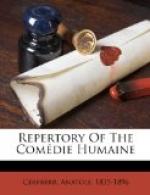BLONDET (Virginie), wife by second marriage of Emile Blondet; born in 1797; daughter of the Vicomte de Troisville; granddaughter of the Russian Princesse Scherbelloff. She was brought up at Alencon, with her future husband. In 1819 she married the General de Montcornet. Twenty years later, a widow, she married the friend of her youth, who this long time had been her lover. [Jealousies of a Country Town. The Secrets of a Princess. The Peasantry.] She and Mme. d’Espard tried to convert Lucien de Rubempre to the monarchical side in 1821. [A Distinguished Provincial at Paris.] She was present at Mlle. des Touches’, about 1830, when Marsay told about his first love, and she joined in the conversation. [Another Study of Woman.] She received a rather mixed set, from an aristocratic standpoint, but here might be found the stars of finance, art and literature. [The Member for Arcis.] Mme. Felix de Vandenesse saw Nathan the poet for the first time and noticed him particularly at Mme. de Montcornet’s, in 1834, 1835. [A Daughter of Eve.] Mme. Emile Blondet, then Madame la Generale de Montcornet, passed the summer and autumn of 1823 in Burgundy, at her beautiful estate of Aigues, where she lived a burdened and troubled life among the many and varied types of peasantry. Remarried, and now the wife of a prefect, eight years or so before February, 1848, time of Louis Philippe, she visited her former properties. [The Peasantry.]
BLUTEAU (Pierre), assumed name of Genestas. [The Country Doctor.]
BOCQUILLON, an acquaintance of Mme. Etienne Gruget. In 1820, rue des Enfants-Rouges, Paris, she mistook for him the stock-broker, Jules Desmarets, who was entering her door. [The Thirteen.]
BOGSECK (Madame van), name bestowed by Jacques Collin on Esther van Gobseck when, in 1825, he gave her, transformed morally and intellectually, to Lucien de Rubempre, in an elegant flat on rue Taitbout. [Scenes from a Courtesan’s Life.]
BOIROUGE, president of the Sancerre Court at the time when the Baronne de la Baudraye held social sway over that city. Through his wife, he was related to the Popinot-Chandiers, to Judge Popinot of Paris, and to Anselme Popinot. He was hereditary owner of a house which he did not need, and which he very gladly leased to the baronne for the purpose of starting a literary society that, however, degenerated very soon into an ordinary clique. Actuated by jealousy, President Boirouge was one of the principals in the defeat of Procureur Clagny for deputy. He was reputed to be unchaste at repartee. [The Muse of the Department.]




